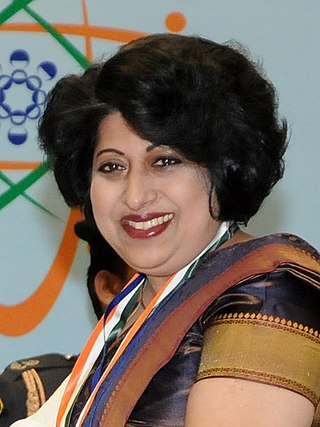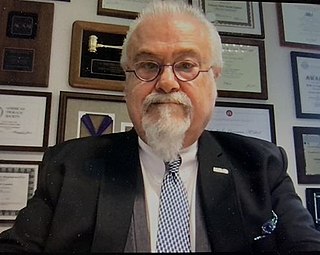Related Research Articles

Allergies, also known as allergic diseases, are various conditions caused by hypersensitivity of the immune system to typically harmless substances in the environment. These diseases include hay fever, food allergies, atopic dermatitis, allergic asthma, and anaphylaxis. Symptoms may include red eyes, an itchy rash, sneezing, coughing, a runny nose, shortness of breath, or swelling. Note that food intolerances and food poisoning are separate conditions.
Vega machines are a type of electroacupuncture device used in pseudoscientific Vega testing, which proponents claim can diagnose allergies and other illnesses. The forerunner to the Vega test was electroacupuncture according to Voll developed by Reinholdt Voll in the 1950s. Helmut Schimmel modified the technique in the 1970s and presented it under the name Vega test.
An allergist is a physician specially trained to manage and treat allergies, asthma and the other allergic diseases. They may also be called immunologists.
Nambudripad's Allergy Elimination Techniques (NAET) is a form of alternative medicine which proponents claim can treat allergies and related disorders. The techniques were devised by Devi Nambudripad, a California-based chiropractor and acupuncturist, in 1983, drawing on a combination of ideas from applied kinesiology, acupuncture, acupressure, nutritional management, and chiropractic methods.

Thomas Alexander Evelyn Platts-Mills, FRS son of British member of parliament and barrister John Platts-Mills, is a British allergy researcher and director of the Division of Allergy and Clinical Immunology at the University of Virginia School of Medicine.
Meyer Stanley Balter, MD, FRCPC, FACP, FCCP is a Canadian physician specializing in asthma, sarcoidosis and chronic obstructive pulmonary disease (COPD).

Ruby Pawankar has been president of the World Allergy Organization (WAO), 2012 and 2013. She is the first Indian and first woman president of WAO, which was established in 1951. Currently she is past president, WAO, president of the Asia Pacific Association of Allergy Asthma and Clinical Immunology (APAAACI) and council member of Collegium Internationale Allergolicum (CIA). She is professor of allergy, department of pediatrics at Nippon Medical School in Tokyo, Japan, and guest professor at Showa University School of Medicine, Tokyo, Japan, Kyung Hee University School of Medicine, Seoul, Korea and St. John's Medical College, Bengaluru, India. She is a recipient of Pravasi Bharatiya Samman 2010 for excellence in medicine, from the president of India.
Charlotte Cunningham-Rundles, an American physician, is the David S. Gottesman Professor of Immunology at the Mount Sinai School of Medicine in New York City. a specialist in primary immunodeficiency disorders. She is also director of the Immunodeficiency Clinic at Mount Sinai Hospital, and the program director of their Allergy Immunology Fellowship training program.
Andrew D. Luster is the Persis, Cyrus and Marlow B. Harrison Professor of Medicine at Harvard Medical School, and the Chief of the Division of Rheumatology, Allergy and Immunology at Massachusetts General Hospital. He is Director of its Research Center for Immunology and Inflammatory Diseases, and a member of the Dana-Farber/Harvard Cancer Center's Cancer Immunology program.
Igor Petrovych Kaidashev is a Ukrainian immunologist and allergist, MD, and Professor. Igor Kaidashev is President of the Ukrainian Society of Immunology, Allergy and Immunorehabilitation, Professor of the Department of Internal Medicine No. 3 with Phthisiology, and Vice-Rector for Research & Development at Poltava State Medical University (PSMU) since 2010.

Asghar Aghamohammadi was an Iranian (Persian) medical scientist, Immunologist and Immunology professor at the Tehran University of Medical Sciences. Aghamohammadi had studied in many institutes, including the Ahvaz Jundishapur University of Medical Sciences, Tehran University of Medical Sciences, Great Ormond Street Hospital and the University of Toyama. He had been one of the most distinguished Iranian Immunologists and awarded many national scientific prizes for his works, mostly in the field of primary immunodeficiency. Aghamohammadi is recognized internationally by hundreds of publications in this field and was the most important contributor to awareness of primary immunodeficiencies and to the management of immunodeficient patients in Iran. He had even been regarded as one of the most notable Iranian people in some lists.

Kari C. Nadeau is the Chair of the Department of Environmental Health at Harvard School of Public Health and John Rock Professor of Climate and Population Studies. She is adjunct professor at Stanford University in the Department of Pediatrics and the co-chair of the Medical Societies Consortium for Climate Change and Health. She practices Allergy, Asthma, Immunology in children and adults. She has published over 400+ papers, many in the field of climate change and health. Her team focuses on quantifying health outcomes of solutions as they pertain climate change mitigation and adaptation at the local, regional, country, and global levels. Dr. Nadeau, with a team of individuals and patients and families, has been able to help major progress and impact in the clinical fields of immunology, infection, asthma, and allergy. Dr. Nadeau is a member of the National Academy of Medicine and the U.S. EPA Children’s Health Protection Committee.
Gail Ina Greenberg Shapiro was an American pediatric allergist based in Seattle. She was a faculty member at the University of Washington School of Medicine. In 2001, she became the first democratically elected president of the American Academy of Allergy, Asthma, and Immunology (AAAAI).
Suranjith Seneviratne is a doctor from Sri Lanka who practices in allergology and immunology.
Erika von Mutius is a German pediatrician and allergologist at the Helmholtz Center Munich and the Ludwig-Maximilians-University of Munich. Her research interests include paediatrics, pediatric pneumology, allergology and epidemiology.
June James is a Canadian pediatrician and professor at the University of Manitoba. James was the first Black woman admitted to the University of Manitoba College of Medicine. She was president of the College of Physicians and Surgeons of Manitoba from 2002 to 2003 and has received multiple awards for her work, including YWCA Woman of the Year Award (1981), the Queen Elizabeth 50th Jubilee Medal, and the Order of Manitoba (2004).
Cezmi Akdis is a medical researcher in the field of immunology. He is director of the Swiss Institute of Allergy and Asthma Research (SIAF) in Davos, Switzerland and the editor in chief of the journal Allergy.
Marc E. Rothenberg is an American physician-scientist who has made significant contributions to the fields of allergy, gastroenterology, and immunology. He is currently a Professor of Pediatrics, at Cincinnati Children's Hospital Medical Center, and the University of Cincinnati College of Medicine, the Director of the Division of Allergy and Immunology, the Director of the Cincinnati Center for Eosinophilic Disorders, and the principal investigator of the Consortium of Eosinophilic Disease Researchers (CEGIR) as part of the Rare Disease Clinical Research Network of the National Institute of Health. Rothenberg's research is focused on eosinophilic gastrointestinal diseases.

Giorgio Walter Canonica is an Italian allergist, pulmonologist and professor of Respiratory Medicine at Humanitas University, Milan, Italy and Director Personalized Medicine Asthma & Allergy Center at Humanitas Research Hospital IRCCS-Milano Italy since December 2016. He is known for his research work related to innovative treatment strategies for allergic diseases which includes biological response modifier in form of targeted immunotherapy with primary emphasis on sublingual immunotherapy (SLIT). He has served as Secretary General and President elect of World Allergy Organisation for six consecutive years and has served as president of the same organization during 2007–09. He is also the vice-president of INTERASMA.
Anthony Barrington "Barry" Kay was a British immunologist known for his research in asthma and allergy. He was a professor at Imperial College London and a consultant immunologist to Royal Brompton Hospital.
References
- 1 2 3 4 "Canadian Medical Hall of Fame 2017 Inductee". Doctors Manitoba. June 16, 2017.
- ↑ "Simons, Frances Estelle Reed". Manitoba Archival Information Network.
- 1 2 3 "Estelle Simons MD, FRCPC". Children’s Hospital Research Institute of Manitoba. Archived from the original on 2018-10-09. Retrieved 2018-12-02.
- 1 2 3 "Awards". Canadian Society of Allergy and Clinical Immunology.
- ↑ "Medal of Service". Canadian Medical Association. Archived from the original on 2018-12-02. Retrieved 2018-12-02.
- ↑ "Order of Canada Appointees – June 2024". Governor General of Canada. Retrieved 2024-06-27.